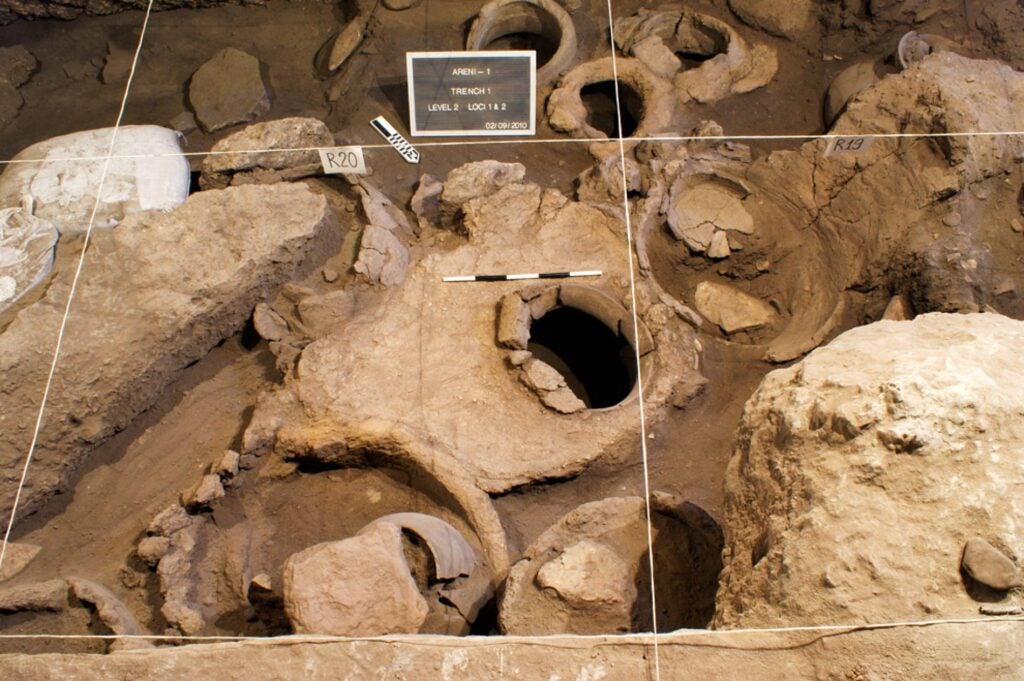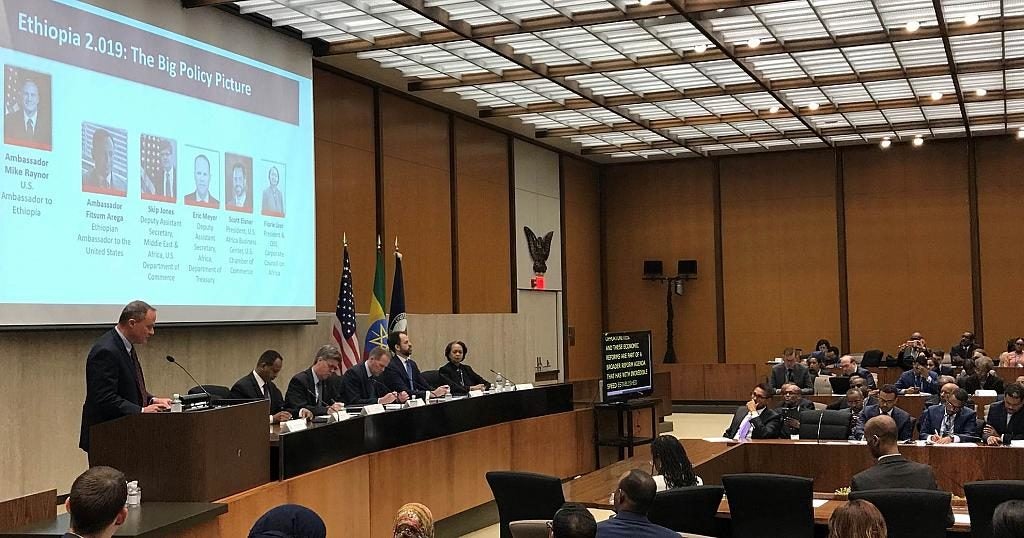Partnering with Embassies to Spur Social Entrepreneurship Globally
June 7, 2019 | John Heffern
Today public funding of essential services is shrinking, creating significant challenges. But there is a solution: public-private partnerships to drive bottom-up change. Enterprise-led development and partnerships can jumpstart innovation, inclusiveness, environmental sustainability, and shared prosperity.
While serving as Ambassador to Armenia, my wife’s and my interest in Armenian archeology led to a major, multi-stake-holder, multi-million dollar public private partnership to promote rural development, entrepreneurship and innovation. New enterprises are springing up in fruit processing and crafts. Rural sites, such as Armenia’s unique Areni Cave (below), are contributing to tourism and other rural job creation programs.
 Areni Cave: Earliest Known Wine Making Vessels, Photo by Gregory Areshian, UCLA
Areni Cave: Earliest Known Wine Making Vessels, Photo by Gregory Areshian, UCLA
Now, at Georgetown’s Beeck Center for Social Impact and Innovation and Institute for the Study of Diplomacy, I promote such bottom up change by fostering engagement and partnerships among embassies, entrepreneurs and entrepreneurship organizations. As entrepreneurship and social entrepreneurship evolve to include more hybrid for profit and not for profit models, we seek to help drive that activity in a positive direction.
I am connecting entrepreneurs with foreign embassies in Washington and U.S. embassies abroad. This is uncontested market space, where little is being done to demonstrate to embassies and organizations the potential for mutually beneficial partnerships. The partnerships are natural because the missions of our embassies and the entrepreneurship organizations overlap in fundamental ways. All these organizations can double their impact through enterprise-led development and partnerships.
1. Linking our missions. The Department of State and U.S. embassies have long sought to shape and sustain a peaceful, prosperous, just, and democratic world and foster conditions for stability and progress. At least five key American entrepreneurship groups have similar missions:
- Ashoka: Support social entrepreneurs with innovative solutions to society’s most pressing social, cultural, and environmental challenges.
- Echoing Green: Support visionaries around the world who are transforming their communities, addressing economic development, racial and gender equity, and environmental sustainability.
- Endeavor: Create a world in which the most valuable & influential companies of our time are those solving humanity’s most pressing challenges.
- Unreasonable Goals: Support the most effective entrepreneurial solutions in the world towards each of the Sustainable Development Goals.
- Global Good Fund: Invest in leadership development to promote enterprise growth and achieve global good.
2. Creating Partnerships. I am building on these related missions to foster joint efforts. To do this, I have initiated opportunities for embassies and organizations to meet and explore their shared goals and interests.
- In March, I helped bring together the U.S. and Norwegian embassies, the Chamber of Commerce, and entrepreneurs from Ashoka and Unreasonable Goals to seek opportunities for collaboration.
- In April at the Spanish Embassy, I connected more than two dozen entrepreneurs with embassy and foreign trade personnel to help them double their impact through partnership.
At both events, lively discussion unearthed several suggestions for changes in foreign assistance policy that could help promote entrepreneurship overseas. Follow-up meetings to deepen collaboration are in the works. One common theme was the need for European embassies and governments to loosen restrictions on working with for profit social businesses to facilitate partnerships. At our urging, French and EU officials agreed to look into this suggestion at a round table discussion on social entrepreneurship at the DC-based residence of Halcyon Incubator in April. France is hosting a major summit on Social Entrepreneurship in July.
3. Building trust between embassies and entrepreneurs. I have devoted the last ten years of my Foreign Service and post-Foreign Service career to building this trust and creating these ties. Let me give one example. In 2014, as U.S. Ambassador to Armenia, I helped The Global Good Fund get established in the country and the region. I invited the group to local community events and introduced them to key people to further social entrepreneurship in Armenia. Perhaps most effective, was a salon-style event hosted at my residence, which helped launch The Global Good Fund and other social entrepreneurship groups in Armenia and beyond.
Now at Georgetown, I am promoting these partnerships around the world. Africa, as the continent with the world’s second fastest economic growth rate and fastest youth population growth, holds tremendous potential for entrepreneurs from around the world. Enterprise-led development and social entrepreneurship have real potential to create jobs with positive social and environmental impact. We are taking advantage of several important near-term Africa-related opportunities to boost this potential and build trust.
In May, the Department of State hosted a major two-day event on growth, investment and entrepreneurship in Ethiopia. Government and embassy officials, investors, entrepreneurs and entrepreneurship organizations used this opportunity to seek areas for collaboration and mutual benefit. During this conference, we brought the key stake-holders to Georgetown to foster dialogue and brain-storm about next steps. One take-away was recognition of the tremendous work being done by Echoing Green to promote social entrepreneurship in East Africa and the desire to collaborate. After the meeting, we linked Echoing Green’s leaders with Ethiopian Government officials, U.S. Embassy leaders and the key NGOs that sponsored the event.

Ethiopia Partnership Forum: Mortara Center, Georgetown
The U.S. Embassy in Togo, a leader in the State Department on social entrepreneurship promotion, hosted an important conference on the movement last year. We participated in the program, and the excitement that it generated, led the embassy to host a three week boot camp for social entrepreneurs from five West African countries in June this year. The strong response of local entrepreneurs to these events demonstrates the growing collaboration and trust between the key groups and officials involved.
4. Improving the entrepreneurial environment. The major entrepreneurship event of the year has been the Global Entrepreneurship Summit (GES), co-hosted since 2009 by the United States and another country. In June, we partnered with the Netherlands on GES2019, which was held in The Hague. Over two days, thousands of government officials and private sector leaders explored ways to advance the impact of entrepreneurship in five key areas: agriculture, water, energy, health and connectivity. During the summit, we did what we could to build trust, promote partnerships, and improve the climate for entrepreneurship around the world, drawing on the lessons we have learned from this effort.
5. Expanding the vision of our students. A key element of the project has been the tremendous contribution of our Georgetown student volunteers. Eight graduate and undergraduate students provided essential research on the state of entrepreneurship in the relevant countries, helped organize the events and drafted action plans. None of the students had prior exposure to social entrepreneurship, so the learning curve has been steep and the experience rewarding. Together, they are working through the stages of the Beeck Center’s student engagement framework – Learn, Explore, Act and Partner. We are building a cadre of committed and talented young people to help shape the social entrepreneurship movement around the world for years to come.
As this project moves into its second year, I will increasingly use these meetings and events to deepen the policy dialogue on enterprise-led development around the world and produce concrete outcomes. Through public-private partnerships, each organization and stake-holder will be able to double its impact as it seeks to accomplish its social, economic and environmental goals. I thank the Institute for the Study of Diplomacy and the Beeck Center for giving me the opportunity to pursue this work.